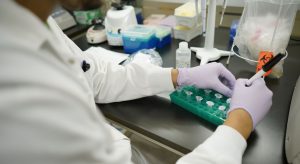Dr. Melanie Spears
Co-Director, Diagnostic Development
Dr. Spears’ research focuses novel approaches to translate scientific research into innovative treatment approaches that will ultimately improve survival in cancer patients.
Understanding of the molecular complexity of cancer leads to accurate diagnostic approaches to ensure that patients receive the most appropriate treatment. Her team uses genomic, transcriptomic and proteomic profiling to understand mechanisms of growth, immune evasion and progression within patient samples. Her research focuses on developing new diagnostic approaches to improve patient diagnosis and treatment decision-making.
Experience & Education
- Post-Doctoral fellow, University of Edinburgh, Scotland
- Post-Doctoral fellow, Cancer Research UK, Scotland
- PhD, University of Edinburgh, Scotland
- BSc Heriot Watt University, Edinburgh, Scotland
Current Affiliations
- Co-Director, Diagnostic Development, OICR
- Principal Research Scientist, Diagnostic Development, OICR
- Assistant Professor, Laboratory of Medicine & Pathobiology, University of Toronto
Select Publications
- Spears M, Kornaga EN, Lyttle N, Liao L, Bayani J, Quintayo MA, Yao CQ, D’Costa A, Boutros PB, Twelves C, Pritchard KI, Levine MN, Nielsen TO, Shepherd L, Bartlett JMS. A histone gene signature predicts anthracycline response in early breast cancer. JCO Precision Oncology May 2019;3:13
- Chong T, Sarac A, Yao CQ, Liao L, Lyttle N, Boutros PC, Bartlett JMS, Spears M. Deregulation of the spindle assembly checkpoint is associated with paclitaxel resistance in ovarian cancer. J Ovarian Res. 2018 Apr 4;11(1):27.
- Spears M, Yousif F, Lyttle N, Bourtos PC, Munro AF, twelves C, Pritchard KI, Levine MN, Shepherd L, Bartlett JMS. A four gene signature predicts benefit from anthracyclines: Evidence from the BR9601 and MA5 clinical trials. Oncotarget Oct 2015; 6(31):31693-701.
- Braunstein M, Liao L, Lyttle N, Lobo N, Taylor KJ, Krzyzanowski PK, Kalatskaya I, Yao CQ, Stein LD, Boutros PC, Twelves CJ, Marcellus R, Bartlett JMS, Spears M. Downregulation of histone H2A and H2B pathways is associated with anthracycline sensitivity in breast cancer . Breast Cancer Research Feb 2016, 18(1):16.
- Spears M, Lyttle N, D’Costa A, Chen BE, Yao CQ, Boutros PC, Burnell M, Levine MN, O’Brien P, Shepherd L, Bartlett JMS A four gene signature of chromosome instability (CIN4) predicts for benefit from taxanes in the NCIC-CTG MA21 clinical trial. Oncotarget March 2016; 7(31):49099.
Research Areas
Disease Areas
Patents
- Spears M, Bartlett J, Yousif F, Bourtos P Methods and Devices for predicting anthracycline treatment efficacy European Patent No: 3169815
- Spears M, Bartlett J , Braunstein M, Krzyzanowski PM. Kalatskaya I, Stein L. Histone gene module predicts anthracycline benefit, Patent, A 18 gene expression signature that predicts response to anthracycline treatment European Patent No: 3169815
- Spears M, Bartlett J , Braunstein M, Krzyzanowski PM. Kalatskaya I, Stein L. Histone gene module predicts anthracycline benefit, Patent, A 18 gene expression signature that predicts response to anthracycline treatment PCT/CA2016/000247
In the News

New precision diagnostics predict risk and response to breast cancer therapies
Jul 05, 2022

Patient perspectives fuelling translational OICR studies
Oct 05, 2022

New directors of OICR Diagnostic Development program set sights on bringing discoveries to the clinic
Dec 15, 2022

Ask a Cancer Researcher: How can we predict if breast cancer will come back?
Aug 29, 2023
Looking Ahead
Receive the latest news, event invites, funding opportunities and more from the Ontario Institute for Cancer Research.

